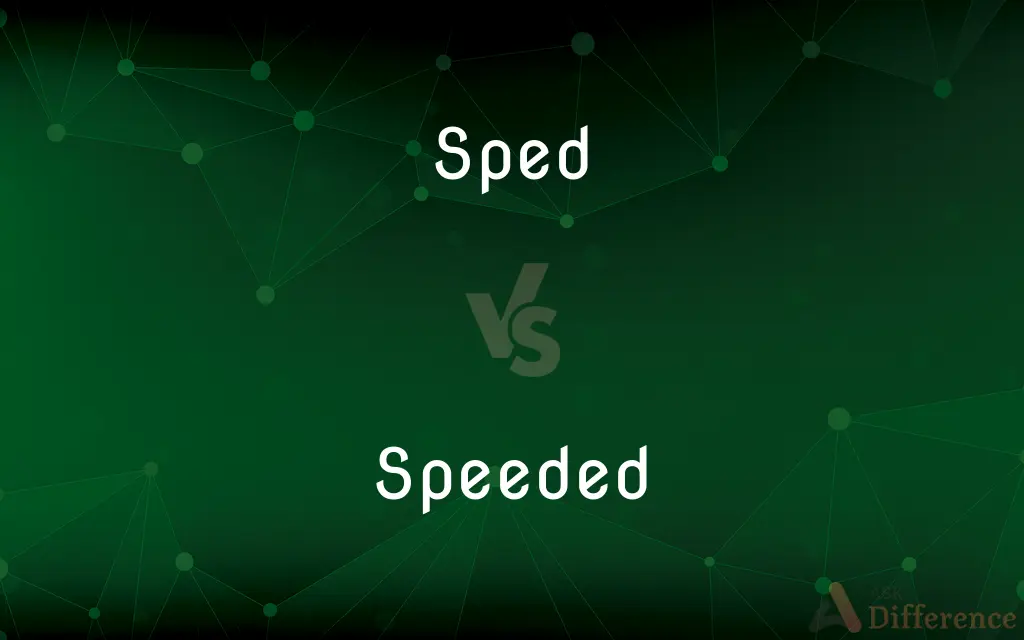Sped vs. Speeded — What's the Difference?
Edited by Tayyaba Rehman — By Fiza Rafique — Updated on October 27, 2023
"Sped" is the past tense of "speed" commonly used in general contexts, while "Speeded" is also a past tense form of "speed", often used in specific, formal situations.

Difference Between Sped and Speeded
Table of Contents
ADVERTISEMENT
Key Differences
"Sped" and "Speeded" are both past tense and past participle forms of the verb "speed". "Sped" is commonly used in everyday language and is widely accepted in general contexts. For instance, when speaking of a car that moved quickly, one might say it "Sped past the house".
"Speeded", though less common than "Sped", is not incorrect. It tends to be used in more formal or specific situations. One might hear "Speeded" in the context of camera work, where the action has been intentionally accelerated, as in "They Speeded up the footage".
Historically, English verbs had regular and irregular forms. While "Speeded" follows the regular pattern where "-ed" is added to the base form of the verb, "Sped" is the irregular form. Over time, as language evolved, some irregular forms became more popular due to ease of pronunciation or other factors.
In terms of regional preferences, "Sped" is widely accepted and understood in both British and American English. "Speeded", while understood in both dialects, might be found more frequently in older texts or formal writings.
Lastly, it's essential to be context-aware. For general references to moving quickly, "Sped" is preferable. However, for specific actions like accelerating footage or intentionally hastening a process, "Speeded" might be more apt.
ADVERTISEMENT
Comparison Chart
Common Usage
General contexts of moving quickly.
Specific, formal situations like camera work.
Regularity
Irregular form.
Regular form.
Origin
Historical irregular form of "speed".
Regular "-ed" form of "speed".
Preference
More common in everyday language.
Less common, found in formal contexts.
Grammatical Role
Past tense and past participle of "speed".
Past tense and past participle of "speed".
Compare with Definitions
Sped
Hastened an action.
He Sped through his tasks.
Speeded
Intentionally accelerated.
They Speeded up the video for effect.
Sped
Operated at high speed.
The machine Sped without error.
Speeded
Facilitated quick movement.
The express lane Speeded up checkout.
Sped
Progressed swiftly.
Time Sped by during the vacation.
Speeded
Increased pace intentionally.
The instructor Speeded up the lessons.
Sped
Moved quickly.
The car Sped down the highway.
Speeded
Distance traveled divided by the time of travel.
Sped
Went or was sent rapidly.
The package Sped to its destination.
Speeded
The limit of this quotient as the time of travel becomes vanishingly small; the first derivative of distance with respect to time.
Sped
A past tense and a past participle of speed.
Speeded
The magnitude of a velocity.
Sped
Simple past tense and past participle of speed
Speeded
Swiftness of action
He wrote the first chapter with great speed.
Sped
A special education student, usually an autistic person.
Speeded
The act of moving rapidly
Finished the race in a burst of speed.
Speeded
The state of being in rapid motion; rapidity
The river's speed made a rescue difficult.
Speeded
A transmission gear or set of gears in a motor vehicle
What speed is the car in now?.
Speeded
A numerical expression of the sensitivity of a photographic film, plate, or paper to light.
Speeded
The capacity of a lens to accumulate light at an appropriate aperture.
Speeded
The length of time required or permitted for a camera shutter to open and admit light.
Speeded
(Slang) A stimulant drug, especially amphetamine or methamphetamine.
Speeded
(Slang) One that suits or appeals to a person's inclinations, skills, or character
Living in a large city is not my speed.
Speeded
(Archaic) Prosperity; luck.
Speeded
To go, move, or proceed quickly
Sped to the rescue.
Speeded
To drive at a speed exceeding a legal limit
Was speeding on the freeway.
Speeded
To pass quickly
The days sped by. The months have sped along.
Speeded
To move, work, or happen at a faster rate; accelerate
His pulse speeded up.
Speeded
(Slang) To be under the influence of a stimulant drug.
Speeded
To prove successful; prosper.
Speeded
To get along in a specified manner; fare.
Speeded
To cause to move or proceed quickly; hasten
No wind to speed the boat.
Speeded
To increase the speed or rate of; accelerate. Often used with up
Speed up a car.
Sped up production.
Speeded
To further, promote, or expedite (a legal action, for example).
Speeded
(Archaic) To help to succeed or prosper; aid.
Speeded
(British) speed
Speeded
(of a test) Measured in terms of speed.
A speeded lexical decision task
Speeded
Hastened a process formally.
He Speeded up the assembly line.
Speeded
Executed quickly in a specific setting.
The workers Speeded through their quotas.
Common Curiosities
Can I use "Sped" and "Speeded" interchangeably?
Generally, yes, but context matters. "Speeded" may sound better in formal settings.
Which form is older, "Sped" or "Speeded"?
Both forms have historical roots, but "Sped" is the irregular, older form.
Is "Speeded" incorrect to use?
No, it's just less common and often used in specific situations.
Is "Sped" used in both American and British English?
Yes, "Sped" is accepted in both dialects.
Do all verbs have both regular and irregular forms?
No, but some verbs like "speed" do have both forms.
Are there rules on when to use "Sped" vs. "Speeded"?
No strict rules, but context and regional preferences can guide the choice.
Is "Sped" more commonly used than "Speeded"?
Yes, "Sped" is more commonly used in general contexts.
In which context might I hear "Speeded" more often?
In formal contexts or when referring to intentionally accelerating a process.
Can I say "The car Speeded past me"?
While grammatically correct, "The car Sped past me" is more commonly used.
Why might someone choose "Sped" over "Speeded"?
"Sped" is more commonly used and might sound more natural in many contexts.
Why do we have two past tense forms for "speed"?
English evolved with both regular and irregular verb forms.
Is "Speeded" up a common phrase?
Yes, especially in contexts like accelerating video footage.
Is "Speeded" a newer form of the verb?
No, both forms have been around, but "Speeded" follows the regular "-
Does "Speeded" sound more formal?
Yes, it often sounds more formal or specific than "Sped".
Share Your Discovery

Previous Comparison
Blush vs. Rouge
Next Comparison
Paradox vs. OxymoronAuthor Spotlight
Written by
Fiza RafiqueFiza Rafique is a skilled content writer at AskDifference.com, where she meticulously refines and enhances written pieces. Drawing from her vast editorial expertise, Fiza ensures clarity, accuracy, and precision in every article. Passionate about language, she continually seeks to elevate the quality of content for readers worldwide.
Edited by
Tayyaba RehmanTayyaba Rehman is a distinguished writer, currently serving as a primary contributor to askdifference.com. As a researcher in semantics and etymology, Tayyaba's passion for the complexity of languages and their distinctions has found a perfect home on the platform. Tayyaba delves into the intricacies of language, distinguishing between commonly confused words and phrases, thereby providing clarity for readers worldwide.














































